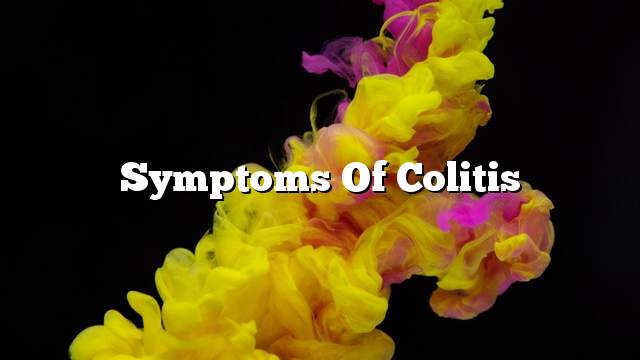The disease is a colitis is a disease that affects the lining of the large intestine, ie the colon from the bottom, resulting in exposure to many of the infections and ulcers, which show obvious pain on the patient, and is a viral infection, which affects individuals, a disease The result of nervous tension, and the thinking of severe and excess, and the psychological stresses of the injured.
The disease tends to occur in families frequently, and the disease may not appear quickly on the patient, and in cases of intractable, the doctor may remove the colon.
Symptoms of colitis
The most common symptoms of the process of infection with colitis:
- Patient feeling very tired.
- Continuous loss of weight.
- Loss of appetite for food.
- Bleeding from the rectum.
- Lack of body fluids and various nutrients.
Ulcerative colitis patients are more likely to develop colorectal cancer, and therefore have to undergo a regular checkup with a specialist.
Causes of Colitis
The underlying cause of ulcerative colitis is unknown. Doctors believe that the human immune system responds to the effect of a virus or bacteria, leading to inflammation of the intestinal wall. The human immune system consists of a group of blood cells and other chemicals, whose mission is to find and kill germs and viruses in the human body.
If the intestinal immune system attacks, it can cause inflammation, swelling, damage and scarring. Ulcerative colitis usually affects people between the ages of 15 and 40, although it is possible to infect children and the elderly as well. Ulcerative colitis also affects men and women themselves, and appears to be transmitted by heredity.
The list of germs that can cause inflammation of the colon: Chigellae, Salmonella, Coliform, Staphylococcus, Clostridium. Contaminated amoebiasis can be considered the most common cause of colitis. The resulting infection is the primary cause of the spread of colitis in people with immunosuppression.
There are other rare causes, but they can cause colitis, including radiotherapy for the pelvic or prostate area, or a lack of blood supply (Ischemia) for a specific area of the colon. In both cases the inflammation is localized and not spread.
Risk factors for colitis
There are many factors that increase the risk of colitis, including:
- Young age, where colitis occurs in people under the age of 45 years.
- There is a family history of the disease, where studies suggest that a family with a genetic history is more likely to have colitis.
- The existence of a person’s mental illness, such as depression, personality disorder, or sexual abuse during childhood.
Foods that cause inflammation of the colon
It is not yet possible to determine the role of food in particular in the effect on the colon, but there are some foods that can cause the symptoms of inflammation, including:
- Alcohol, in the case of excessive consumption.
- Smoking of all kinds.
- Milk and some of its derivatives.
- Some types of dried fruits.
- Drink beverages that contain gases.
- Eat lots of hot foods, and eat spicy a lot.
- Eat pulses of all kinds.
- Eat laxatives very much.
- Nuts of all kinds.
- Fresh vegetables.
- Seeds.
Diagnosis of colitis
Diagnosis of colitis requires a comprehensive clinical examination by a specialist, and then a series of tests to diagnose ulcerative colitis. Blood tests may reveal a lack of red blood cell count, anemia or anemia, and therefore bleeding in the intestines.
Blood tests can also reveal an increase in the number of leukocytes, indicating inflammation. By examining a sample of stool, the doctor can detect the presence of bleeding or infection in the intestines or not. The doctor may need to have a colonoscopy, the insertion of the binocular through the anus to find a clearer view of the lining of the large intestine.
Treatment of colitis
The treatment of ulcerative colitis is aimed at:
- Put the inflammation under control.
- Correcting the undernourishment of the patient.
- Relieve abdominal pain, diarrhea, and lower gastrointestinal bleeding.
Treatment involves giving the patient the necessary supplements, medications, or admission to the hospital if necessary. In some cases, several procedures may be combined, as required by the case.
If the symptoms of the infection is a result of the patient’s intake of some types of food, it is possible to control these symptoms by avoiding to avoid eating foods that irritate the intestine, such as foods full of spices or milk sugar, known as lactose. Several types of drugs can also be used to treat ulcerative colitis, including aminosalicates, corticosteroids, and immunosuppressants.
About 25-40% of patients with ulcerative colitis need colonctomy, due to severe bleeding, worsening of the disease, rupture of the colon, or a risk of cancer. Your doctor may recommend colon cleansing if your medication fails, or if the side effects of corticosteroids or other medications are a threat to the patient’s health.
